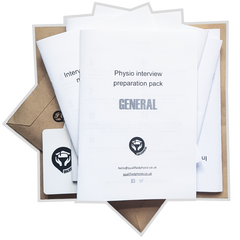This is an excerpt from our Band 5 / Graduate Acute/Respiratory Physio interview prep resource, which contains 40 pages of interview questions and answers and other resources specific to the area - available as a standalone pack or part of our Band 5 Bundle.
A 42-year-old patient who had COVID-19 three months ago presents with ongoing fatigue, breathlessness, and cognitive difficulties ("brain fog"). They report that their symptoms worsen after physical or mental exertion. What would your management be?
Long COVID continues to affect 10-20% of those infected, with symptoms lasting 12 weeks or longer. As a physiotherapist, you play a crucial role in managing long COVID symptoms.
Long COVID management requires a comprehensive and individualised approach. Fatigue is one of the most challenging aspects, necessitating careful implementation of pacing strategies to balance activity and rest, avoiding post-exertional malaise. Energy conservation techniques, such as prioritising tasks and breaking activities into smaller, manageable chunks, are highly effective. Gradually increasing activity levels is key, but this must be done cautiously and individually tailored.
Breathlessness management involves teaching techniques like diaphragmatic breathing and pursed-lip breathing, as well as positioning strategies like forward lean sitting or high side lying. The "3 Ps" approach (Pace, Plan, and Prioritize activities) is crucial for managing exertion-induced breathlessness.
Based on the latest research, the effectiveness of graded exercise therapy (GET) for long COVID is controversial and not generally recommended.

Here's how we would approach this interview question:
1. Thorough assessment:
- Conduct a detailed subjective history, including the nature and severity of symptoms, exacerbating and alleviating factors, and impact on daily activities.
- Perform objective assessments such as heart rate and oxygen saturation monitoring, and functional capacity tests (e.g., 1-minute sit-to-stand test).
- Screen for red flags that may indicate need for specialist referral (e.g., cardiac or respiratory complications).
2. Education and expectation management:
- Explain the nature of long COVID, emphasizing that recovery can be prolonged but improvement is possible.
- Discuss the concept of post-exertional malaise (PEM) and its implications for activity management.
3. Pacing and energy conservation:
- Introduce the concept of pacing, which involves balancing activity and rest to avoid triggering PEM.
- Help the patient identify their energy envelope and teach strategies to stay within it.
- Encourage the use of activity diaries to track symptoms and identify patterns.
4. Gradual, individualised activity planning:
- Based on the latest research, avoid traditional graded exercise therapy (GET) as it may worsen symptoms in long COVID patients.
- Instead, implement a very gradual and individualised approach to increasing activity levels, closely monitored for symptom exacerbation.
- Start with low-intensity activities and progress slowly, always staying within the patient's tolerance.
5. Breathing exercises and techniques:
- Teach diaphragmatic breathing and pursed-lip breathing to manage breathlessness.
- Introduce techniques like the 3-minute breathing space for managing cognitive overload.
6. Cognitive strategies:
- Provide strategies for managing "brain fog," such as breaking tasks into smaller chunks, using memory aids, and scheduling cognitive breaks.
7. Sleep hygiene:
- Offer advice on improving sleep quality, as poor sleep can exacerbate long COVID symptoms.
8. Psychological support:
- Assess for anxiety and depression, which are common in long COVID patients.
- Consider referral to psychological services if needed.
9. Multidisciplinary approach:
- Collaborate with other healthcare professionals (e.g., occupational therapists, psychologists) for comprehensive care.
- Consider referral to a dedicated long COVID clinic if available.
10. Regular monitoring and adjustment:
- Schedule regular follow-ups to assess progress and adjust the management plan as needed.
- Be prepared to modify the approach based on the patient's response and emerging research.
It's crucial to note that the management of long COVID is an evolving field. As a physiotherapist, staying updated with the latest research and guidelines is essential to provide the best care for these patients.
|
For extra points: |
|
________________
Be aware that this is only a single example of a question and its suggested answer, and depending on the type of job, the place of work, or even the interview panel members, you might need to adapt and/or provide other elements in your answer.
If you'd like to know more, see other questions and answers, and even have a go at practising them, you can grab our interview preparation packs or book on one of our one-to-one sessions.
Related products:

Acute/Respiratory interview preparation pack
Our MSK pack designed for newly-graduated physios or physios applying for band 5 / junior positions includes interview questions and answers, key articles and references and top tips for the job, amongst others.
6 interview preparation packs, for less.
_______________
References
National Institute for Health and Care Excellence, 'COVID-19 Rapid Guideline: Managing the Long-Term Effects of COVID-19', NICE Guideline [NG188], 2023 https://www.nice.org.uk/guidance/ng188 [accessed 16 Feb 2024]
World Health Organization, 'Support for Rehabilitation: Self-Management after COVID-19-Related Illness', 2021 https://www.who.int/publications/m/item/support-for-rehabilitation-self-management-after-covid-19-related-illness [accessed 16 Feb 2024]
NHS England, 'National Post-COVID Syndrome Service Specifications', 2021 https://www.england.nhs.uk/coronavirus/publication/national-guidance-for-post-covid-syndrome-assessment-clinics/ [accessed 16 Feb 2024]
Chartered Society of Physiotherapy, 'COVID-19: The Road to Recovery Activity Planner', 2024 https://www.csp.org.uk/public-patient/covid-19-road-recovery [accessed 19 Feb 2024]
Décary, S., et al., 'Humility and Acceptance: Working Within Our Limits With Long COVID and Myalgic Encephalomyelitis/Chronic Fatigue Syndrome', Journal of Orthopaedic & Sports Physical Therapy, 51.5 (2021), 197-200
Office for National Statistics, 'Prevalence of Ongoing Symptoms Following Coronavirus (COVID-19) Infection in the UK', 2024 https://www.ons.gov.uk/peoplepopulationandcommunity/healthandsocialcare/conditionsanddiseases/bulletins/prevalenceofongoingsymptomsfollowingcoronaviruscovid19infectionintheuk/latest [accessed 11 Feb 2024]
UK Health Security Agency, 'COVID-19: Infection Prevention and Control (IPC)', 2024 https://www.gov.uk/government/publications/wuhan-novel-coronavirus-infection-prevention-and-control [accessed 16 Feb 2024]
British Thoracic Society, 'BTS Guidance on Respiratory Follow Up of Patients with a Clinico-Radiological Diagnosis of COVID-19 Pneumonia', 2024 https://www.brit-thoracic.org.uk/document-library/quality-improvement/covid-19/resp-follow-up-guidance-post-covid-pneumonia/ [accessed 16 Feb 2024]
-




![[2022] Band 5 / Junior MSK Physiotherapy interview question & its answer explained](http://qualifiedphysio.co.uk/cdn/shop/articles/pexels-andrea-piacquadio-3756042_compact.jpg?v=1641201968)